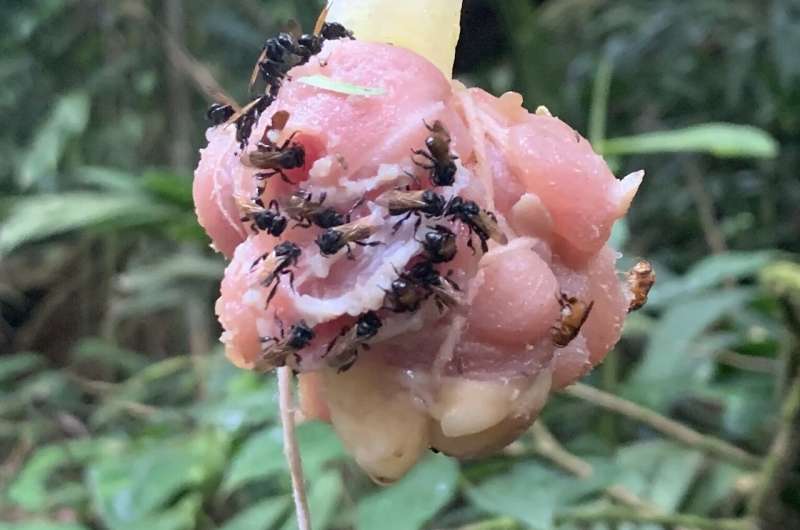When bees get a taste for dead things: Meat-eating ‘vulture bees’ sport acidic guts

A little-known species of tropical bee has evolved an extra tooth for biting flesh and a gut that more closely resembles that of vultures rather than other bees.
Typically, bees don’t eat meat. However, a species of stingless bee in the tropics has evolved the ability to do so, presumably due to intense competition for nectar.
“These are the only bees in the world that have evolved to use food sources not produced by plants, which is a pretty remarkable change in dietary habits,” said UC Riverside entomologist Doug Yanega.
Honeybees, bumblebees, and stingless bees have guts that are colonized by the same five core microbes. “Unlike humans, whose guts change with every meal, most bee species have retained these same bacteria over roughly 80 million years of evolution,” said Jessica Maccaro, a UCR entomology doctoral student.
Given their radical change in food choice, a team of UCR scientists wondered whether the vulture bees’ gut bacteria differed from those of a typical vegetarian bee. They differed quite dramatically, according to a study the team published today in the American Society of Microbiologists’ journal mBio.
To track these changes, the researchers went to Costa Rica, where these bees are known to reside. They set up baits—fresh pieces of raw chicken suspended from branches and smeared with petroleum jelly to deter ants.
The baits successfully attracted vulture bees and related species that opportunistically feed on meat for their protein. Normally, stingless bees have baskets on their hind legs for collecting pollen. However, the team observed carrion-feeding bees using those same structures to collect the bait. “They had little chicken baskets,” said Quinn McFrederick, a UCR entomologist.
For comparison, the team also collected stingless bees that feed both on meat and flowers, and some that feed only on pollen. On analyzing the microbiomes of all three bee types, they found the most extreme changes among exclusive meat-feeders.
“The vulture bee microbiome is enriched in acid-loving bacteria, which are novel bacteria that their relatives don’t have,” McFrederick said. “These bacteria are similar to ones found in actual vultures, as well as hyenas and other carrion-feeders, presumably to help protect them from pathogens that show up on carrion.”
One of the bacteria present in vulture bees is Lactobacillus, which is in a lot of humans’ fermented food, like sourdough. They were also found to harbor Carnobacterium, which is associated with flesh digestion.
“It’s crazy to me that a bee can eat dead bodies. We could get sick from that because of all the microbes on meat competing with each other and releasing toxins that are very bad for us,” Maccaro said.
The researchers noted that these bees are unusual in a number of ways. “Even though they can’t sting, they’re not all defenseless, and many species are thoroughly unpleasant,” Yanega said. “They range from species that are genuinely innocuous to many that bite, to a few that produce blister-causing secretions in their jaws, causing the skin to erupt in painful sores.”
In addition, though they feed on meat, their honey is reportedly still sweet and edible. “They store the meat in special chambers that are sealed off for two weeks before they access it, and these chambers are separate from where the honey is stored,” Maccaro said.
The research team is planning to delve further into vulture bee microbiomes, hoping to learn about the genomes of all bacteria as well as fungi and viruses in their bodies.
Ultimately, they hope to learn more about the larger role that microbes play in overall bee health.
“The weird things in the world are where a lot of interesting discoveries can be found,” McFrederick said. “There’s a lot of insight there into the outcomes of natural selection.”
Newly identified bacteria may help bees nourish their young
Laura L. Figueroa et al, Why Did the Bee Eat the Chicken? Symbiont Gain, Loss, and Retention in the Vulture Bee Microbiome, mBio (2021). DOI: 10.1128/mBio.02317-21
Citation:
When bees get a taste for dead things: Meat-eating ‘vulture bees’ sport acidic guts (2021, November 23)
retrieved 23 November 2021
from https://phys.org/news/2021-11-bees-dead-meat-eating-vulture-sport.html
This document is subject to copyright. Apart from any fair dealing for the purpose of private study or research, no
part may be reproduced without the written permission. The content is provided for information purposes only.
For all the latest Science News Click Here
For the latest news and updates, follow us on Google News.

